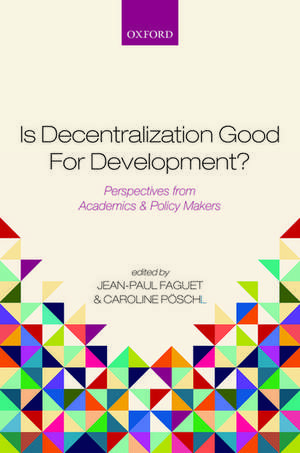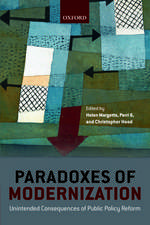Is Decentralization Good For Development?: Perspectives from Academics and Policy Makers
Editat de Jean-Paul Faguet, Caroline Pöschlen Limba Engleză Hardback – 13 aug 2015
Preț: 732.67 lei
Preț vechi: 1050.96 lei
-30% Nou
Puncte Express: 1099
Preț estimativ în valută:
140.24€ • 152.38$ • 117.88£
140.24€ • 152.38$ • 117.88£
Carte tipărită la comandă
Livrare economică 09-15 aprilie
Preluare comenzi: 021 569.72.76
Specificații
ISBN-13: 9780198737506
ISBN-10: 0198737505
Pagini: 352
Ilustrații: Figures and Tables
Dimensiuni: 172 x 241 x 27 mm
Greutate: 0.67 kg
Editura: OUP OXFORD
Colecția OUP Oxford
Locul publicării:Oxford, United Kingdom
ISBN-10: 0198737505
Pagini: 352
Ilustrații: Figures and Tables
Dimensiuni: 172 x 241 x 27 mm
Greutate: 0.67 kg
Editura: OUP OXFORD
Colecția OUP Oxford
Locul publicării:Oxford, United Kingdom
Notă biografică
Jean-Paul Faguet is Professor of the Political Economy of Development at the London School of Economics. He is also Chair of the Decentralization Task Force at Columbia University's Initiative for Policy Dialogue. His research blends quantitative and qualitative methods to investigate the institutions and organizational forms that underpin rapid development. He has published extensively in the academic literature, including Governance from Below: Decentralization and Popular Democracy in Bolivia, which won the W.J.M. Mackenzie Prize for best political science book of 2012. His teaching and research focus on comparative political economy, new institutional economics, economic development and economic history.Caroline Pöschl is a Ph.D. candidate in the Department of International Development, London School of Economics and Political Science. Her dissertation explores the relationship between taxation and accountability at the local government level in Mexico. Caroline has experience working on decentralisation, subnational management, and taxation at the World Bank and Inter-American Development Bank. Her research interests include local governance and decentralisation.















